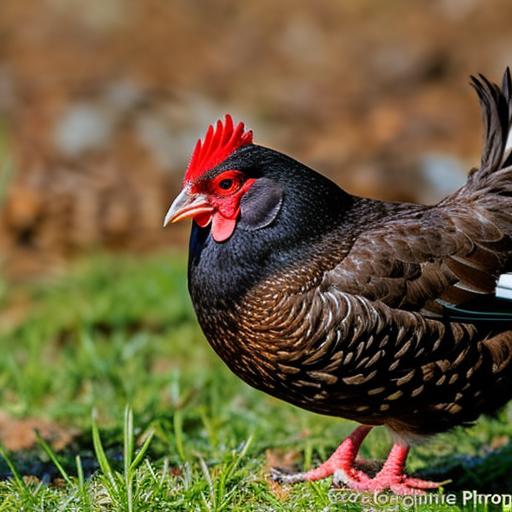Keeping chickens in New Jersey has become increasingly popular in recent years. More and more people are realizing the benefits of having their own flock of chickens, from the joy of raising their own food to the satisfaction of knowing where their eggs come from. In this article, we will explore the ins and outs of keeping chickens in NJ, including the laws and regulations, choosing the right breed, creating a safe coop, feeding and caring for chickens, dealing with noise and odor concerns, keeping chickens healthy, handling eggs and manure, connecting with other chicken owners, and the overall joy of raising chickens.
Key Takeaways
- Understanding NJ laws and regulations for keeping chickens is crucial
- Choosing the right breed of chickens is important for backyard success
- Creating a safe and comfortable coop is essential for happy chickens
- Feeding and caring for chickens requires attention and knowledge
- Keeping chickens in your backyard has numerous benefits for you and your family
Understanding the laws and regulations for keeping chickens in NJ
Before diving into the world of backyard chicken keeping, it’s important to understand the laws and regulations in your specific area. While keeping chickens is generally allowed in New Jersey, there may be certain restrictions or guidelines that you need to follow. For example, some towns may have limits on the number of chickens you can keep or require a permit. It’s important to check with your local municipality or zoning office to find out the specific laws for your area.
The New Jersey Department of Agriculture also provides resources and information on keeping backyard poultry. They have guidelines on biosecurity measures to prevent the spread of diseases, as well as information on poultry health and management. It’s a good idea to familiarize yourself with these resources to ensure that you are providing a safe and healthy environment for your chickens.
Choosing the right breed of chickens for your backyard
When it comes to choosing the right breed of chickens for your backyard, there are several factors to consider. Different breeds have different characteristics, such as egg-laying ability, temperament, size, and cold or heat tolerance. Some popular breeds for backyard flocks include Rhode Island Reds, Plymouth Rocks, Sussex, and Leghorns.
If you’re primarily interested in egg production, breeds like Leghorns and Rhode Island Reds are known for their high egg-laying capabilities. If you have children or want chickens that are friendly and docile, breeds like Silkies or Orpingtons may be a better fit. It’s important to do your research and choose a breed that aligns with your needs and preferences.
Creating a safe and comfortable coop for your chickens
A good coop is essential for keeping chickens safe and comfortable. It should provide protection from predators, shelter from the elements, and enough space for the chickens to move around. When building or buying a coop, there are a few key factors to consider.
First, make sure the coop is secure and predator-proof. This means using sturdy materials, such as hardware cloth, to cover windows and openings. The coop should also have a solid roof to protect against rain and snow. Additionally, it’s important to provide adequate ventilation to prevent moisture buildup and ensure good air circulation.
Second, consider the size of the coop. The general rule of thumb is to allow at least 4 square feet of space per chicken inside the coop, and 10 square feet per chicken in the run. This will give the chickens enough room to move around comfortably.
Finally, provide nesting boxes for the chickens to lay their eggs. These should be filled with clean bedding material, such as straw or wood shavings, and placed in a quiet and secluded area of the coop.
Feeding and caring for your chickens in NJ
Feeding and caring for chickens in New Jersey is relatively straightforward. Chickens require a balanced diet that includes a combination of commercial feed, fresh water, and occasional treats or supplements.
There are different types of chicken feed available on the market, including starter feed for young chicks, grower feed for adolescent chickens, and layer feed for hens that are laying eggs. It’s important to choose a feed that is appropriate for the age and stage of your chickens. Additionally, chickens should always have access to fresh water, which should be changed daily.
In addition to feed, chickens can also benefit from occasional treats or supplements. This can include kitchen scraps, such as fruits and vegetables, as well as mealworms or other protein-rich treats. However, it’s important to avoid feeding chickens anything that is toxic or harmful to them, such as chocolate, onions, or avocado.
Caring for chickens in different seasons and weather conditions is also important. In the summer, chickens may need extra shade and access to cool water to prevent heat stress. In the winter, they may need additional insulation in the coop and a heat source to keep warm. It’s important to monitor your chickens closely and make adjustments as needed to ensure their health and well-being.
The benefits of keeping chickens in your backyard

There are numerous benefits to keeping chickens in your backyard. One of the most obvious benefits is the availability of fresh eggs. There’s nothing quite like collecting eggs from your own flock and enjoying them for breakfast. Not only are backyard eggs delicious, but they are also typically more nutritious than store-bought eggs.
In addition to fresh eggs, chickens can also provide other benefits. They are excellent at pest control, as they eat insects and other pests that may be lurking in your yard. Chickens also produce high-quality fertilizer in the form of manure, which can be used to enrich your garden soil.
Furthermore, keeping chickens can be a rewarding and educational experience for both adults and children. It teaches responsibility and provides an opportunity to connect with nature and learn about the natural behaviors of these fascinating creatures.
Dealing with noise and odor concerns when keeping chickens in NJ
One common concern when it comes to keeping chickens is noise and odor. While it’s true that chickens can make noise, especially when they are laying eggs or feeling threatened, there are ways to minimize the noise level.
One option is to choose quieter breeds, such as Silkies or Orpingtons, which are known for their calm and docile nature. Additionally, providing enough space for the chickens and keeping them entertained with toys or treats can help reduce boredom and excessive noise.
As for odor concerns, proper coop maintenance is key. Regularly cleaning the coop and removing soiled bedding can help keep odors at bay. It’s also important to provide good ventilation in the coop to prevent moisture buildup, which can contribute to unpleasant smells.
Tips for keeping your chickens healthy and disease-free
Keeping chickens healthy and disease-free is essential for their well-being and productivity. There are several steps you can take to ensure that your flock stays healthy.
First and foremost, practice good biosecurity measures. This includes keeping your coop clean and free from pests, such as rodents or wild birds. It’s also important to quarantine new birds before introducing them to your existing flock to prevent the spread of diseases.
Second, provide a balanced diet and access to clean water. Chickens require a diet that is high in protein, vitamins, and minerals to stay healthy. Additionally, make sure the water is changed daily and kept clean to prevent the spread of bacteria or parasites.
Regular health checks are also important. This includes checking for signs of illness or injury, such as lethargy, loss of appetite, or abnormal droppings. If you notice any concerning symptoms, it’s best to consult with a veterinarian who specializes in poultry health.
How to handle eggs and manure produced by your backyard chickens
Handling eggs and manure produced by your backyard chickens is an important aspect of chicken keeping. When it comes to eggs, it’s important to collect them regularly to prevent them from becoming dirty or cracked. Eggs should be stored in a cool place, such as a refrigerator, and used within a reasonable amount of time.
As for chicken manure, it can be a valuable source of fertilizer for your garden. However, it’s important to compost the manure before using it on your plants. This helps to break down any potential pathogens or parasites that may be present in the manure. Composting also helps to reduce the odor and make the nutrients more readily available to plants.
Connecting with other chicken owners in NJ for support and advice
Connecting with other chicken owners in New Jersey can be a great way to get support and advice. There are several resources available for connecting with fellow chicken enthusiasts, both online and offline.
Local groups or clubs dedicated to backyard chickens can provide a wealth of knowledge and support. These groups often hold meetings or events where you can learn from experienced chicken keepers and share your own experiences.
Online forums and social media groups are another great way to connect with other chicken owners. These platforms allow you to ask questions, share photos, and get advice from a wide range of people who have experience with backyard chickens.
The joy of raising your own chickens and enjoying fresh eggs at home
Raising your own chickens and enjoying fresh eggs at home is a truly rewarding experience. There’s something special about knowing exactly where your food comes from and being able to provide for yourself and your family.
Not only do backyard chickens provide fresh eggs, but they also offer companionship and entertainment. Chickens have unique personalities and behaviors that can be fascinating to observe. They can also be quite entertaining, whether they’re chasing bugs in the yard or dust bathing in the sun.
Furthermore, raising chickens can be a great way to teach children about responsibility, nature, and where their food comes from. It provides an opportunity for hands-on learning and can foster a deeper connection with the natural world.
Keeping chickens in New Jersey is a growing trend that offers numerous benefits, from fresh eggs to pest control and fertilizer. By understanding the laws and regulations, choosing the right breed, creating a safe coop, feeding and caring for chickens, addressing noise and odor concerns, keeping chickens healthy, handling eggs and manure, connecting with other chicken owners, and enjoying the overall joy of raising chickens, you can embark on a rewarding journey of backyard chicken keeping. So why not consider adding a flock of chickens to your backyard and experience the joy of raising your own food?
If you’re wondering whether you can keep chickens in New Jersey, you’ll be pleased to know that it is indeed possible. However, before diving into the world of backyard chicken keeping, it’s important to understand the basics. One crucial aspect is providing a suitable chicken coop for your feathered friends. To learn more about chicken coop options, check out this informative article on Poultry Wizard: Chicken Coop Portage. It provides valuable insights into the different types of coops available and offers tips on how to choose the right one for your needs.
FAQs
What are the laws regarding keeping chickens in NJ?
In New Jersey, each municipality has its own laws regarding keeping chickens. It is important to check with your local government to determine the specific regulations in your area.
How many chickens can I keep in NJ?
The number of chickens you can keep in NJ varies by municipality. Some areas have no limit, while others may restrict the number based on the size of your property.
Do I need a permit to keep chickens in NJ?
Some municipalities in NJ require a permit to keep chickens, while others do not. It is important to check with your local government to determine if a permit is required in your area.
What are the requirements for keeping chickens in NJ?
The requirements for keeping chickens in NJ vary by municipality. Some common regulations include keeping the chickens in a secure coop or enclosure, providing adequate food and water, and keeping the area clean and free of odors.
Can I keep roosters in NJ?
Some municipalities in NJ allow roosters to be kept, while others do not. It is important to check with your local government to determine if roosters are allowed in your area.
What are the benefits of keeping chickens in NJ?
Keeping chickens in NJ can provide a source of fresh eggs, as well as fertilizer for gardens. Chickens can also be enjoyable pets and can help control pests in the yard.
Meet Walter, the feathered-friend fanatic of Florida! Nestled in the sunshine state, Walter struts through life with his feathered companions, clucking his way to happiness. With a coop that’s fancier than a five-star hotel, he’s the Don Juan of the chicken world. When he’s not teaching his hens to do the cha-cha, you’ll find him in a heated debate with his prized rooster, Sir Clucks-a-Lot. Walter’s poultry passion is no yolk; he’s the sunny-side-up guy you never knew you needed in your flock of friends!







